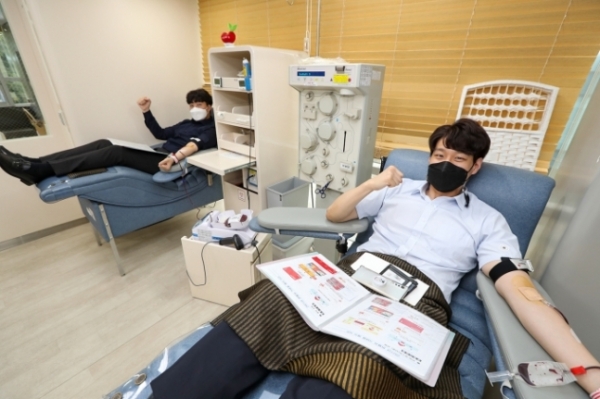
World Blood Donor Day (WBDD) 2021 took place on June 14. Every year since 2005, the World Health Organization (WHO) has marked World Blood Donor Day as one of the 11 official global public health campaigns along with World Health Day, World AIDS Day, World No Tobacco Day, etc. This year, the WBDD’s slogan was “Give blood and keep the world beating.” According to the WHO, the message highlights “the essential contribution blood donors make to keep the world pulsating by saving lives and improving others’ health.” The campaign appreciates former blood donors and encourages other healthy people to engage in the selfless action.
The significance of blood donation rose more than ever during the COVID-19 pandemic. Although it is important for the amount of donated blood to be constant, the pandemic caused people to become reluctant of visiting public hospitals to give their blood, resulting in low blood donation rates. Compared to COVID-19-free 2019, the number of blood donors in Korea has decreased 10% in 2020, from 1,423,610 to 1,281,773 people. Consequently, the number of total blood donations in Korea has decreased 6.4% in 2020, from 2,791,092 to 2,611,401 cases. The amount of blood donated at blood donation centers located near commercial facilities shrunk in particular, due to the ban of private gatherings of five or more people.
Many citizens confessed that they were afraid of becoming infected with COVID-19 during the needling process of blood giving. Also, the powerful self-quarantine rules caused citizens to become hesitant about visiting blood donation centers. However, contrary to these worries, there have been no reported cases of COVID-19 infection during the blood donating process ever since the pandemic has progressed, due to the fact that COVID-19 is a respiratory disease and cannot be spread through blood.
In response, Korean Red Cross is promoting their blood donation reservation app, Red Connect. The Ministry of Health and Welfare of South Korea (MOHW) is putting forth an effort to increase blood donation throughout society and stabilizing the blood supply. First, the MOHW is encouraging government departments, local governments, public institutions, and affiliated organizations to participate in blood donation. Next, the MOHW requested the appropriate use of blood in medical institutions. Finally, the ministry is urging for individual blood donation on their official website, http://www.mohw.go.kr.
Yet blood supply in Korea remains insufficient. Professor Sohn Jang-wook of the Korea University Anam Hospital asserted that “we are in need of a social media campaign similar to the Ice Bucket Challenge, but instead authenticating blood donation certificates.”
Men who weigh more than 50kg and women who weigh more than 45kg are eligible for blood donation. Blood donations may be of the whole blood, or specific components, such as platelets, plasma, and packed red blood cells. The recommended age range for whole blood donation is 16 to 69 years, while platelet and platelet plasma component donation are only allowed in the age range of 17 and 59. According to the Blood Management Act, people with systolic blood pressure below 90mmHg or above 180mmHg, diastolic blood pressure above 100mmHg, heartbeat lower than 50 times per minute or higher than 100 times per minute, are not allowed to give their blood. After the COVID-19 outbreak, qualifications regarding fever and respiratory conditions have been newly added. Also, all visitors from overseas are not allowed to donate their blood in Korea for a month. Further guides on blood donor qualifications are to be checked on the Korean Red Cross website.


